 The Cajun Cheesehead Chronicles
The Cajun Cheesehead Chronicles
by Jack Caldwell
Jane Austen’s Villains – A Ranking
Greetings, everyone. Jack Caldwell here.
Jane Austen created some wonderful heroes and heroines—Elizabeth & Darcy, Marianne & Brandon, Anne & Wentworth, among others—but to truly appreciate these characters, she also gifted the reader many memorable villains.
Unfortunately, IMHO, the otherwise excellent teleplays and screenplays of the various adaptations have simplified or distorted these fascinating creations. Therefore, I have decided to rank Miss Austen’s heavies from least to worse. I based my rankings solely on cruelty and harm to others. That is why annoying folks like Lydia Bennet, Mr. Collins, Lady Russell, John Thorpe, Elizabeth Elliot, and Mrs. Elton don’t make the list. Insufferable, interfering, self-destructive, and stupid behavior does not a villain make.
I have made a decision NOT to list Lady Catherine de Bourgh as a villain. Before you go nuts, allow me to explain. Exactly who in Pride and Prejudice did Lady Cat actually harm? Not Mr. Darcy—she has no power over him. Not Elizabeth Bennet—Lady Cat just defended her own interests and that of Anne de Bourgh. Actually, before she suspected Darcy’s interest, she seemed to enjoy Elizabeth’s visits to Rosings. The bottom line is this—while a bully, Lady Cat did nothing but act ill-bred. That does not make her evil. The self-deluded lady just loves her daughter, like Mrs. Bennet, and stands up for her in a very unpleasant manner. Her motivations are understandable, natural–and laughable.
Please note I have ignored the movies and mini-series productions, as well as my writings and the works of my wonderful Austen Variations comrades. These rankings are based solely upon what Jane Austen actually wrote.
Don’t agree with me? Wonderful. Let’s discuss!
#19 – Frank Churchill from Emma – I’m with George Knightley on this guy. He has used everybody ill—and they are all delighted to forgive him. He is a fortunate man indeed! His lame-brained scheme to keep his engagement to Jane Fairfax secret almost damages beyond repair Jane, Emma, his father, and nearly everyone else in Highbury. A self-centered moron.
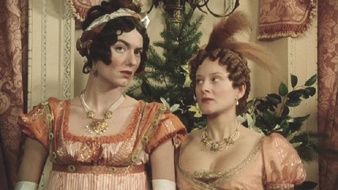 #17 (tie) – Caroline Bingley and Louisa Hurst from Pride and Prejudice – The women that women love to hate. But really, they barely make this list. True, they are unpleasant snobs and social climbers, but the only wrong they committed was to deceive Jane Bennet about Mr. Bingley’s affections and hide the fact of her presence in London from their brother. Caroline and Louisa were trying to boost their standing in London society, a mighty task, given their roots in trade. They were not as cruel as Lucy Steele, and Caroline did try to warn Elizabeth off Wickham, a warning that was ignored. At the end of the book, both made amends to a certain extent.
#17 (tie) – Caroline Bingley and Louisa Hurst from Pride and Prejudice – The women that women love to hate. But really, they barely make this list. True, they are unpleasant snobs and social climbers, but the only wrong they committed was to deceive Jane Bennet about Mr. Bingley’s affections and hide the fact of her presence in London from their brother. Caroline and Louisa were trying to boost their standing in London society, a mighty task, given their roots in trade. They were not as cruel as Lucy Steele, and Caroline did try to warn Elizabeth off Wickham, a warning that was ignored. At the end of the book, both made amends to a certain extent.
 #16 – Mr. Elton from Emma – A small, vindictive hypocrite. He resents Emma Woodhouse for rebuffing his addresses, and does what he can to hurt poor Harriet Smith. I can’t blame Mrs. Elton for her actions—the foolish woman is influenced by her husband. Elton should not be a clergyman.
#16 – Mr. Elton from Emma – A small, vindictive hypocrite. He resents Emma Woodhouse for rebuffing his addresses, and does what he can to hurt poor Harriet Smith. I can’t blame Mrs. Elton for her actions—the foolish woman is influenced by her husband. Elton should not be a clergyman.
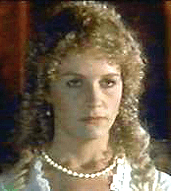 #15 – Isabella Thorpe from Northanger Abbey – Miss Thorpe earns her entry on this list by engaging herself to James Morland and befriending Catherine Morland solely because she thought them rich. That doesn’t stop her from flirting with Captain Frederick Tilney while James is out of town. And she drops James as soon as she realizes the truth of his modest circumstances, breaking the poor man’s heart. There’s a word for a shallow girl like her, and it rhymes with “bore,” which, by the way, describes her empty-headed and boastful brother, John Thorpe.
#15 – Isabella Thorpe from Northanger Abbey – Miss Thorpe earns her entry on this list by engaging herself to James Morland and befriending Catherine Morland solely because she thought them rich. That doesn’t stop her from flirting with Captain Frederick Tilney while James is out of town. And she drops James as soon as she realizes the truth of his modest circumstances, breaking the poor man’s heart. There’s a word for a shallow girl like her, and it rhymes with “bore,” which, by the way, describes her empty-headed and boastful brother, John Thorpe.
 #14 – Mary Crawford from Mansfield Park – Also known as Dark Lizzy. Yes, she is beautiful, intelligent, and witty, but she is missing a moral core. She thinks of no one but her immediate family. She wants Edmund Bertram, not for what he is, but for what she can mold him into. The guy is but a toy to her; she does not respect him. When the whole Henry/Maria scandal blows up, her response is to minimize the damage to the Crawfords, completely disregarding the damage to the Bertrams. She blames Fanny Price for the disaster and demands that Edmund choose her over his family. In fact, if one views Mansfield Park as an allegorical novel (which I do), Mary Crawford could be Temptation herself. In any case, she is a corrosive personality.
#14 – Mary Crawford from Mansfield Park – Also known as Dark Lizzy. Yes, she is beautiful, intelligent, and witty, but she is missing a moral core. She thinks of no one but her immediate family. She wants Edmund Bertram, not for what he is, but for what she can mold him into. The guy is but a toy to her; she does not respect him. When the whole Henry/Maria scandal blows up, her response is to minimize the damage to the Crawfords, completely disregarding the damage to the Bertrams. She blames Fanny Price for the disaster and demands that Edmund choose her over his family. In fact, if one views Mansfield Park as an allegorical novel (which I do), Mary Crawford could be Temptation herself. In any case, she is a corrosive personality.
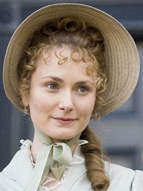 #13 – Lucy Steele from Sense and Sensibility – A sadistic, insecure witch. While it is understandable that she wanted to warn off Elinor Dashwood from her intended, Edward Ferrars, she takes way too much enjoyment from unnecessarily needling her perceived nemesis. Then, when it seems he will be disinherited, she abandons the loyal Edward for his now-rich younger brother.
#13 – Lucy Steele from Sense and Sensibility – A sadistic, insecure witch. While it is understandable that she wanted to warn off Elinor Dashwood from her intended, Edward Ferrars, she takes way too much enjoyment from unnecessarily needling her perceived nemesis. Then, when it seems he will be disinherited, she abandons the loyal Edward for his now-rich younger brother.
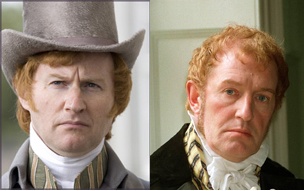 #11 (tie) – John Dashwood from Sense and Sensibility and Sir Walter Elliot from Persuasion – Both weak and useless. John Dashwood allows his witch of a wife to convince him to disregard his father’s last wish of helping his step-mother and half-sisters – in effect, stealing their money He is no man, much less a gentleman. Sir Walter, a pompous idiot, makes the list for spending his family into distress.
#11 (tie) – John Dashwood from Sense and Sensibility and Sir Walter Elliot from Persuasion – Both weak and useless. John Dashwood allows his witch of a wife to convince him to disregard his father’s last wish of helping his step-mother and half-sisters – in effect, stealing their money He is no man, much less a gentleman. Sir Walter, a pompous idiot, makes the list for spending his family into distress.
 #10 – George Wickham from Pride and Prejudice – I hear y’all going crazy out there, but hold on a minute. Yes, Wick-head is loathsome. He’s manipulative, lazy, stupid, greedy, and without shame. But Straw-for-Brains is not evil incarnate. We have to look at his actual crimes. He-Who-Shall-Not-Be-Named lied about Mr. Darcy and tried to elope with Georgiana. Bad enough. El Estúpido deserted from the militia due to debt and was able to convince a very convincible Lydia Bennet to flee with him. Immoral (statutory rape in our day, but not in theirs), but the girl deserves some of the blame, especially when given the opportunity to leave our boy, she refuses. Useless has to be bribed to marry Lydia, but he does marry her. That makes him tons better than Crawford, Elliot, or Willoughby. The bounder is not a bully or sadist, and he doesn’t endanger anyone’s life, steal money from widows, or father any illegitimate children (that we know of). A solid 10th place.
#10 – George Wickham from Pride and Prejudice – I hear y’all going crazy out there, but hold on a minute. Yes, Wick-head is loathsome. He’s manipulative, lazy, stupid, greedy, and without shame. But Straw-for-Brains is not evil incarnate. We have to look at his actual crimes. He-Who-Shall-Not-Be-Named lied about Mr. Darcy and tried to elope with Georgiana. Bad enough. El Estúpido deserted from the militia due to debt and was able to convince a very convincible Lydia Bennet to flee with him. Immoral (statutory rape in our day, but not in theirs), but the girl deserves some of the blame, especially when given the opportunity to leave our boy, she refuses. Useless has to be bribed to marry Lydia, but he does marry her. That makes him tons better than Crawford, Elliot, or Willoughby. The bounder is not a bully or sadist, and he doesn’t endanger anyone’s life, steal money from widows, or father any illegitimate children (that we know of). A solid 10th place.
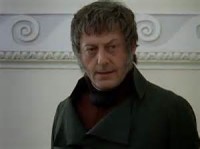 #9 – General Tilney from Northanger Abbey – Dominating his late wife and his living children does not makes the general a villain; rather, it is because he has sweet and innocent Catherine Morland tossed out of Northanger Abbey and forced to take the post coach unescorted back home in the dead of night simply because she was not as rich as he thought. She could have been robbed—or worse. Very badly done. You, sir, are no gentleman. You are a bastard.
#9 – General Tilney from Northanger Abbey – Dominating his late wife and his living children does not makes the general a villain; rather, it is because he has sweet and innocent Catherine Morland tossed out of Northanger Abbey and forced to take the post coach unescorted back home in the dead of night simply because she was not as rich as he thought. She could have been robbed—or worse. Very badly done. You, sir, are no gentleman. You are a bastard.
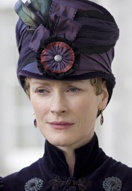 #8 – Fanny Dashwood from Sense and Sensibility – Her crime is not that she wants to keep her brother Edmund away from Elinor Dashwood. Greedy and selfish, she convinces her husband to steal money from his desperate family. If not for the kindness of others, the Dashwoods would have been destitute. She is truly Mrs. Ferrars’s daughter.
#8 – Fanny Dashwood from Sense and Sensibility – Her crime is not that she wants to keep her brother Edmund away from Elinor Dashwood. Greedy and selfish, she convinces her husband to steal money from his desperate family. If not for the kindness of others, the Dashwoods would have been destitute. She is truly Mrs. Ferrars’s daughter.
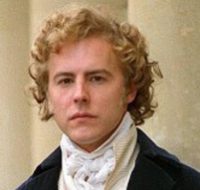 #7 – William Walter Elliot from Persuasion – Another hypocrite. He first denounces the Elliots, and then returns, only because he wishes to safeguard his inheritance of the title. Anne Elliot is his target. When he sees that Mrs. Clay could be a threat to him, he continues to romance Anne while launching an affair with Mrs. Clay. Bad enough, but what puts him beyond the pale is that he stole money from a poor, invalid widow. Despicable.
#7 – William Walter Elliot from Persuasion – Another hypocrite. He first denounces the Elliots, and then returns, only because he wishes to safeguard his inheritance of the title. Anne Elliot is his target. When he sees that Mrs. Clay could be a threat to him, he continues to romance Anne while launching an affair with Mrs. Clay. Bad enough, but what puts him beyond the pale is that he stole money from a poor, invalid widow. Despicable.
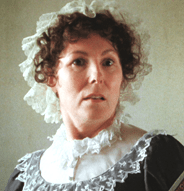 #6 – Mrs. Younge from Pride and Prejudice – Forgot about her, didn’t you? English society depended upon trustworthy servants and employees, particularly those entrusted with the welfare of young ladies. Mr. Darcy counted on Mrs. Younge to take good care of Georgiana. For reasons we can only imagine, she instead plotted with Mr. Wickham. An elopement would have been damaging enough to Georgiana’s reputation, but what if Wickham did not or could not follow through on the marriage? I don’t believe that this wicked woman worried for one minute about that. Mrs. Younge might as well have sold her charge into white slavery. It’s my guess that Wickham didn’t intend to harm Georgiana (key word: “intend”); else he would have blackmailed the Darcys afterward. Therefore, I consider Mrs. Younge’s betrayal of the Darcys worse than Wickham’s.
#6 – Mrs. Younge from Pride and Prejudice – Forgot about her, didn’t you? English society depended upon trustworthy servants and employees, particularly those entrusted with the welfare of young ladies. Mr. Darcy counted on Mrs. Younge to take good care of Georgiana. For reasons we can only imagine, she instead plotted with Mr. Wickham. An elopement would have been damaging enough to Georgiana’s reputation, but what if Wickham did not or could not follow through on the marriage? I don’t believe that this wicked woman worried for one minute about that. Mrs. Younge might as well have sold her charge into white slavery. It’s my guess that Wickham didn’t intend to harm Georgiana (key word: “intend”); else he would have blackmailed the Darcys afterward. Therefore, I consider Mrs. Younge’s betrayal of the Darcys worse than Wickham’s.
 #5 – Henry Crawford from Mansfield Park – Two words—pond scum. A male version of his sister, but worse. I must believe that Crawford considers himself sincere in his pursuit of Fanny Price, but he has a funny way of showing it. He callously flirts with the Bertram sisters, pitting them against each other, just for sport. Then, when the now-wedded Maria indicates she is ripe for an assignation, he conducts an affair with a married woman without a second thought. He flees with her after they are discovered, but soon abandons her. A self-absorbed scoundrel, he wreaks destruction wherever he goes.
#5 – Henry Crawford from Mansfield Park – Two words—pond scum. A male version of his sister, but worse. I must believe that Crawford considers himself sincere in his pursuit of Fanny Price, but he has a funny way of showing it. He callously flirts with the Bertram sisters, pitting them against each other, just for sport. Then, when the now-wedded Maria indicates she is ripe for an assignation, he conducts an affair with a married woman without a second thought. He flees with her after they are discovered, but soon abandons her. A self-absorbed scoundrel, he wreaks destruction wherever he goes.
 #4 – John Willoughby from Sense and Sensibility – I go back and forth between him and Crawford. The only good traits Willoughby owned was his hunting ability and his good taste to fall in love with Marianne Dashwood. That’s about it. He’s a spendthrift who is not above seducing a young woman and leaving her with child, refusing to take responsibly for his actions. And a coward to boot, allowing his rich intended to bully him into writing a most hateful letter to a young lady who had the great misfortune to love him. This poseur resents Colonel Brandon because he recognizes a true gentleman—something Willoughby will never be. A waste of flesh.
#4 – John Willoughby from Sense and Sensibility – I go back and forth between him and Crawford. The only good traits Willoughby owned was his hunting ability and his good taste to fall in love with Marianne Dashwood. That’s about it. He’s a spendthrift who is not above seducing a young woman and leaving her with child, refusing to take responsibly for his actions. And a coward to boot, allowing his rich intended to bully him into writing a most hateful letter to a young lady who had the great misfortune to love him. This poseur resents Colonel Brandon because he recognizes a true gentleman—something Willoughby will never be. A waste of flesh.
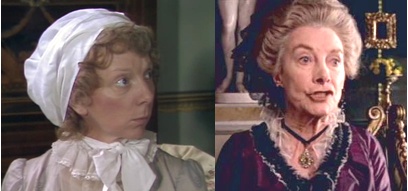 #2 (tie) – Mrs. Norris from Mansfield Park and Mrs. Ferrars from Sense and Sensibility – Two cruel and mentally deficient individuals. Both are sadistic bullies and both are irredeemable. Mrs. Norris has an unhealthy obsession with the Bertram children, while Mrs. Ferrars replaces affection with domination over her brood. I cannot choose between them.
#2 (tie) – Mrs. Norris from Mansfield Park and Mrs. Ferrars from Sense and Sensibility – Two cruel and mentally deficient individuals. Both are sadistic bullies and both are irredeemable. Mrs. Norris has an unhealthy obsession with the Bertram children, while Mrs. Ferrars replaces affection with domination over her brood. I cannot choose between them.
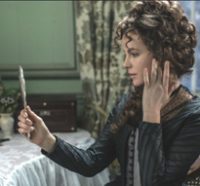 #1 – Lady Susan Vernon from Lady Susan – Have you ever met a worse mother? Just evil.
#1 – Lady Susan Vernon from Lady Susan – Have you ever met a worse mother? Just evil.
So, these are my rankings of nineteen villains found in Jane Austen’s work. A real rouge’s gallery, eh?
Agree? Disagree? Let’s have some fun. Step on up and defend your choices. Remember—it has to be based on the actual novels! I look forward to your arguments.
Until next time, this has been the Cajun Cheesehead Chronicles.
It takes a real man to write historical fiction, so let me tell you a story.


28 comments
Skip to comment form
Lovely and thought provoking ranking as always, Jack. Let’s see where I might disagree – not for its own sake, of course not! 🙂
OK, I haven’t read Lady Susan so I can’t offer an opinion on the top place of your list. Must read it though, it seems…
I find myself wondering, who is the worse sort of person: the two women on your 2nd place (Mrs. Norris, Mrs. Ferrars) who are cruel and sadistic and try to dominate those dependent on them to do their will and to serve their purpose – or the men who ruin young women without a conscience for their pleasure. (Crawford and Willoughby).
Gosh, it’s difficult to rank them without taking into account the actual amount of suffering they cause – and that’s not entirely dependent on them but the course of the novel, other people’s actions and the heroes’/heroines’ inner strength. In what way, for example, is General Tilney better than Mrs. Norris and Mrs. Ferrars? Because we only see one despicably sadistic action of his on stage, vs. the many petty little cruelties of Mrs. Norris? I consider General Tilney on par with the two women, I think.
About Mrs. Younge – yes, she abused a position of trust, but still, the relationship between her and the Darcys was a business one, not that of family (like one might consider Wickham’s relationship with the Darcy family) – I think in business it is also the responsibility of the employer/boss how much trust he places in the employee, to prevent any harm they might cause. The intimate connection, shared past of Wickham with the Darcys was one they could not entirely ignore until he utterly destroyed any claim for clemency, loyalty and trust. I think Wickham’s betrayal was worse, although it doesn’t necessarily make him a greater villain. Also, you say it’s to his credit that he actually marries Lydia – but who is to say what would have happened had Darcy not found them in time – like Colonel Brandon could not find Eliza Williams? Maybe Willoughby might have married Eliza if Brandon turned up before he left his victim and applied pressure of threat and bribery – and maybe Wickham would have left Lydia without a pang of conscience if Darcy had not turned up when he did. Thus, I’m not sure Wickham is any different than Willoughby.
I also place Frank Churchill higher on the list. Well, perhaps he did not act out of malicious intent, but it was out of selfishness and all he regarded was his own comfort and the way of least resistance (his relationship with his aunt). He is weak like John Dashwood. He is lucky that he doesn’t cause as much harm as John Dashwood to his half-sisters and stepmother, and he shows at least some sense in falling in love with a truly good woman, and claiming her when he could although she was poor; and he has some conscience, in seeing, after the fact, what he has done to Jane, Emma and his father. Still, I wish he had not gone entirely unscathed and forgiven by everyone – I’M not entirely sure he has learned his lesson and changed for the better.
I’m sorry I can’t make an actual ranking list (I’ll try and come up with one later if I can) – but I enjoyed picking at yours! Thank you!
Author
Oh, my. You simply must read “Lady Susan”!
The issue I have with Mrs. Ferrars and Mrs. Norris—and Lady Susan—is that all were cruel and sadistic to children. To my mind this puts them just a bit above Crawford and Willoughby, but not by much. Now, Miss Austen didn’t write that Ol’ Pond Scum actually ruined any young woman, so that’s why Willoughby beats him out. You can make the argument that they are tied.
I make the same point about General Tilney. Miss Austen writes that, dominating personality aside, he was truly attached to his late wife. It was not unusual at the time for parents to hold out for the “best’ marriage candidates for their children. One can argue he was more concerned for his own self-interest and pride over his children’s security. What one cannot deny is that he was uninterested in their happiness. His ranking comes from his unforgivable treatment of Miss Morland, which was the grounds for his break with Henry. Mean-spirited? You bet. Sadistic? Not according to my understanding of the word.
Back to Willoughby. He would have never married Eliza. Remember, once Colonel Brandon found out he was the one who seduced Eliza, he fought him in a duel. One can assume that Willoughby refused to acknowledge his fault and take responsibility, thus the duel. Brandon was not a rich man (his income is 2,000/year); he could not bribe Willoughby. He could only force the man to make arrangements for his child’s future.
Is Wickham at a par with Willoughby and Crawford? Perhaps. He did plan to abandon Lydia to flee England. What of other crimes? We cannot read Miss Austen’s mind. We can only go on what she wrote and the customs of Regency England. Without more evidence, I can’t place Wickham higher on the list, given who is higher.
Again, this list is subjective. There is no right and wrong in the rankings. That’s why this exercise id fun. Thanks for playing!
I’m happy with the 1st position. Probably I would not remember her on my own but Lady Susan is my kind of villain, totally self-centred, always acting full of reason.
Author
Yes, indeed. “Love and Friendship” captured Lady Susan well, but the book should not be missed.
Hi jack
Interesting piece and a good take on ranking the villains. However, I feel the female villains top the list. Where is Mrs Clay!
Of all the female villains, Lady Susan is the vilest and comes first on my list, followed by Mary Crawford. With these two ladies, the collateral damage is big. Lady Susan has no boundaries, no motherly feelings. Even if her daughter Fredericka had married Sir James, She still would have carried on with him. She does not stoop to stringing two or more admirers, who and how they are related, who her victims are, her machinations has no holds, no bars. She is the female Don Juan.
Mary Crawford, on the other hand is a ‘player’ like Henry Crawford. Both are two sides of the same coin. Both lacking emotions, they are cruel. I would club Frank Churchill with this group. Mary Crawford, Henry Crawford and Frank Churchill – birds of the same feather.
Mrs Norris, Mrs Yonge and Mrs Ferrars are vile and evil. Even amongst them, I would rate Mrs Norris’ vileness lesser in scale than others. Mrs Norris’s and Mrs Yonge’s needs are basic. They lack male support, without money and are dependent on others for sustenance. Food, clothing and shelter and scavenging for these, is their life. Mrs Norris is always alert about which side of her bread is buttered right from the start and I feel her affections for Maria is genuine, considering Maria being her benefactor’s daughter and also she has spent more time with Maria than Fanny. She moves in with Maia at the end -no matter what, her bread is assured.
Mrs Yonge, on the other hand, I feel, is more sinned against than sinning. She is evil but she does not act alone and is not brainy like Lady Susan or Mary Crawford. Alone, I doubt if she would have acted so vile. But then there won’t be a story. She was more manipulated by Wickham and, in a way, is his victim.
Mrs Yonge and Mrs Clay are birds of the same feather. Mrs Clay is more a pawn in Walter Elliott’s hands as Mrs Yonge is in Wickham’s.
Caroline Bingley and is Lucy Steele are villainous clowns- the former sophisticated and the later uncouth. At least, Caroline is single minded in chasing Darcy, But Lucy Steele is smarter and changes her affiliation faster.
How about a next piece on JA victims?
Author
Okay, let’s talk Dark Lizzy. I really tried to place her higher on the list, but potential for harm is not the same as actually harm. From my readings of “Mansfield Park” (yeah, I’ve read it multiple times), it seems Mary has genuine feelings for both Fanny and Edmund. However, her world-view is warped, and so are her emotions. She has little-to-no-sense of right and wrong. She does little real lasting harm to anyone at Mansfield, but that is because she is “found out”, in a way, during the crisis caused by Crawford and Maria. Who can tell what would have happened if Edmund had married her.
Oh, wait. I know what would have happened. Read my free book “Variations” (Found here: https://austenvariations.com/free-books/)
As for Caroline, as you know, I defend her. She is nothing like the vile Lucy Steele. But that’s just the way I roll. Thanks!
I really dislike Dark Lizzy (exactly because she is the dark side of the beloved personality) but I have to agree with you that she isn’t so much a villain. She is not so much maliciously cruel as shallow and amoral. Warped is a great word to desctibe her!
You forgot another of Mary Crawford’s villainies. Her plans for Edmund should Tom die belong in your list. One might even read it as her hoping that Tom dies. Certainly she could easily see herself as the future Lady Bertram more easily than as the wife of the vicar of a parish in the family’s gift.
Author
That’s Dark Lizzy for ya. Thanks!
Well done! I agree with your assessments except for General Tilney. He should be higher up. And I agree that stupidity doesn’t mean villain.
Author
Sorry–I tried, but I can’t place the general above Fanny Dashwood or WW Elliot, because they stole money from people who desperately needed it.
You’re right that stupidity doesn’t mean villain. Thanks!
I agree with your no 1. I laughed out loud at your piece on Wickham!!! Some lovely descriptions of him. I can’t stand him either.
Author
Thanks. That was a tip-of-the-hat to Mr. Darcy’s P&P POV (found under Free Books, don’t ya know).
Excellent list. I cannot but agree and Lady Susan is the worst excuse for a mother.
Author
It is stunning to read her letters in “Lady Susan.” A true narcissist. Jane Austen was brilliant in this book.
It’s hard to compare JA’s villains because when she really draws their characters in depth you begin to feel it’s all more complicated than “this person is bad”. This is why I can’t rate General Tilney or Mrs Ferrars against Mrs Norris, because I don’t think their characters are done with the same detail.
Mrs Norris strikes me as awful. I would hate to have a Mrs Norris in my life, let alone in my family. She’s absolutely obsessed with defending her own status and does this by treading down anybody inferior while creeping to anyone with power, wealth or social standing. I don’t know what set her off on this path but we can see by Chapter 1 she has habits of mind that prevent her from recognising what she’s doing; so she has no chance of correcting her faults. How can she ever fix what she genuinely cannot see as wrong? Even what should be strengths, like her natural drive and her realism about thrift, are caught up in her self-aggrandising and turn noxious.
I think JA meant to contrast her endless phony humblebragging with Fanny’s real humility…only I’m not sure she pulled it off, because Fanny’s a teeny bit too much of it, you know? But Mrs N is simultaneously my worst villain and the one I pity most, because look how she ends up. The worst real harm she does is in her raising of Maria, and she loves Maria. And Maria doesn’t love her.
Author
Very interesting points–food for thought. The genius of Miss Austen was that she created real characters, people you know and have met. Thanks for contributing.
I laughed at this statement, “Insufferable, interfering, self-destructive, and stupid behavior does not a villain make.”
Mrs. Norris is most vile. I haven’t read “Lady Susan” in a long time. I need to reread to be reminded of how objectionable she is!
Thanks for a fun exercise.
Author
Thank you. IMHO, “Lady Susan” is amazing.
Delightful post and I agree completely. You’ve made me think and you have made me consider just what behavior does a villain make. I wanted to throw Lady Russell into the mix but after reading your evaluation of Lady Catherine, I suppose she falls in that category. She was acting in the place of Anne’s mother and made a decision she thought that dear lady would have. When Wentworth and Anne became betrothed, she did apologize and attempted to make amends. So, I guess, she is not a villain.
Mrs. Clay… I am sorry she didn’t make the list. I imagine she would be on the same level as Lucy Steele. She was conniving, played up to Elizabeth Elliot’s vanity and made herself indispensable to father and daughter. She usurped Anne’s place in Elizabeth’s affection while playing both sides of the family. Where were her children? Funny how Austen always has a character of this ilk in her stories. I wonder if there was such a creature in her life or she just made sure to place this chess piece in the game? Mrs. Clay, Lucy Steele, Isabelle Thorpe, etc.
This was fun, I liked your creative descriptions of our favorite villains we love to hate. Well done.
Author
Thank you so much. I can’t see Lady Russell as a villain, no matter how much Wentworth resents her. In one point, Lady Russell is right–a mere Commander is a poor match for a baronet’s daughter. A full Post-Captain is a whole different matter. And she was Anne’s godmother. Actually, Darcy’s actions with Bingley could be considered worse.
I really didn’t give any thought to Mrs. Clay. I don’t think it was her fault that Elizabeth Elliot liked her better than Anne. But you raise an excellent point about her children. Where were they? Maybe you’ll find out in PERSUADED TO SAIL (huge plug).
Thank you for putting Mrs. Norris right up there at the top! I think she’s my least favorite character in the JA universe. Mind you, I haven’t read Love and Friendship in about 30 years, but I just dug out my juvenilia to read it again. I enjoyed your list and comments, as well as those of your readers. Lots of good food for thought here.
Author
Thank you, Laurie.
Great list! I like your take on Lady Catherine: she’s unpleasant, but she does what she does for her daughter’s sake, not out of malice. I also love you pointing out that moment when Caroline tries to warn Elizabeth about Wickham; that’s always fascinating to me, because to me it feels like one of the only moments where she is sincere send kind (as much as she knows how to be kind). I guess one could argue that it’s a way for her to feel superior, but if she’s trying to get Darcy’s attention on herself, having her rival attached to a man Darcy hates could only help her cause.
And an excellent point about Mr. Elliot! I often forget about his treatment of Mrs. Smith, because I don’t think either of the movie adaptations I like mention it. But it really is shameful of him.
I only vaguely remember Lady Susan, so can’t comment on that. With regard to 2nd place, though, I would absolutely give it for Mrs Norris over Mrs Ferrars. Mrs Ferrar is domineering and unreasonable in her treatment of her sons, but Mrs Norris has made it her life’s business to bully a child, and not just any child, but a particularly vulnerable child whom she has volunteered to care for, then absolutely neglects and abuses, and to top it all off she has the nerve to demand gratitude from her!
Good Ranking! I’m happy you put Willoughby way above Wickham – he deserves it, not only for his previous actions with Eliza and Marianne, but for forcing himself on Elinor, making the lamest, most selfish excuses for his behavior and then forcing her to promise him to relay them to Marianne. Fortunately, the disclosure does her more good than harm.
As to stealing – There wasn’t any actual stealing, neither in John Dashwood’s case (since he made no explicit promise about HOW he would help his sisters) or in Elliot’s case (since he didn’t get the money Mrs. Smith lost, he just didn’t help her get it). However, he did commit another crime – sponging on Mr. Smith, enticing him to spend more than he should, running him into debt, and then refusing to help him.
The two people who did steal – not legally but morally – are Sir Walter Elliot and Wickham, who ran up debts – Sir Walter to the point that caused distress to the people he didn’t pay, and Wickham fled from the people he owed money to, both in Meryton and in Brighton. That is stealing
I wouldn’t rank Mary Crawford that high on the list. Frankly, she seemed a bit too ambiguous for me to regard her as evil. She can be both self-centered and morally questionable . . . and at the same time, compassionate and moral. I believe Mary Crawford is too much of an enigma.
Also, not only would I have included Sir Walter Elliot on this list for being an emotionally abusive parent, I would also include Elizabeth Elliot for being equally abusive in an emotional way toward both Anne Elliot and Mary Musgrove. And I rank both higher on this list than William Elliot.